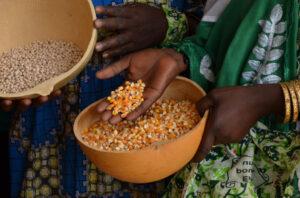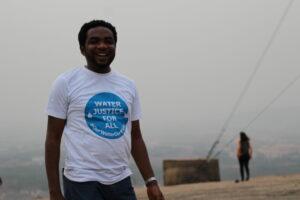[:en]Africa Says, «I Can’t Breathe»: An African Civil Society Perspective on Systemic Racism[:]
«The knee on George Floyd’s neck is the same knee that is on our neck. It is the same knee that justified colonialism in Africa.»
We know this systemic racism started four centuries ago and, through endless and varied legal and political processes, was designed to benefit one section of a society. All other systems are subservient to this system and all other people are subservient to a race, a large number of whom are fighting to keep the privilege they feel is rightfully theirs.
I also see the knee on George Floyd’s neck as also being symbolic of how neoliberalism, and the associated neocolonialism, are putting their knee on the neck of Africa. I hear Africa saying, «I can’t breathe.» There are many avenues by which those in power are putting their knee on the neck of our continent, but let’s just focus on what’s happening in agriculture.
For me, the powers influencing our agricultural future have created a narrative, which is so simple and powerful, and which is told repeatedly until it’s ingrained in our DNA.

We are told that our seeds are old and have little capacity to give us food and they have to be hybridized and genetically modified to be of use; we are told that what we need is more calories and we need to focus on seeds of few crops; we are told that we are not using our land effectively and it should be given to those who can do a better job of it; we are told that our knowledge about farming is backward and we need to modernize with knowledge from the West; we are told that unless we focus on a few staple crops and produce for the market, we’ll remain shackled to subsistence living; and we are told that we need to pump our soil with artificial fertilizers and pesticides if we want to produce enough food.
For all this, we are told, we need business to invest billions of dollars, and without these saviors from the North, we cannot feed ourselves. Our world is defined simply by producing more, not in having healthy, nutritious, and culturally-appropriate food, produced without harming the environment.
A cohort of actors including philanthrocapitalists, aid agencies, governments, academic institutions, and embassies are all working to make this narrative a reality. They talk about transforming African agriculture but what they are doing is creating a market for themselves cleverly couched in a nice sounding language.
The knee on George Floyd’s neck is the same knee that is on our neck. It is the same knee that justified colonialism in Africa. It is the same knee that sees Africa not for what it has, but for what it’s lacking. Those who are putting their knee on our neck look at us as stupid, uncivilized, barbaric, clueless, and disease-ridden, to be controlled and directed by the all-knowing and powerful.

We cannot breathe in Africa as policy spaces in the continent are crowded by outside actors and their cohorts, the bell boys. They create a powerful narrative, they design our policies to suit their needs, they influence our legislation, they formulate our education system so that the products of the system serve their purpose, and they denigrate our culture so that we lose ours and become subservient to theirs.
They do not have to put their own knees physically on us because their culture and ideas are already inherited. The knee on our necks is now our brothers’ and sisters’ knee. The knee on our neck is of different shades of color but it comes from the same source, from those who think that the world belongs to them. It comes from a deep-level disdain and contempt for our very existence.
I think the only way to remove this knee and breathe is to recognize the knee, understand its ways of working, and organize to defend ourselves. Otherwise, we’ll find it difficult to even think of breathing.
A version of this piece originally appeared on Common Dreams. Million Belay is the coordinator for the Alliance for Food Sovereignty in Africa, a Grassroots International ally.[:]

